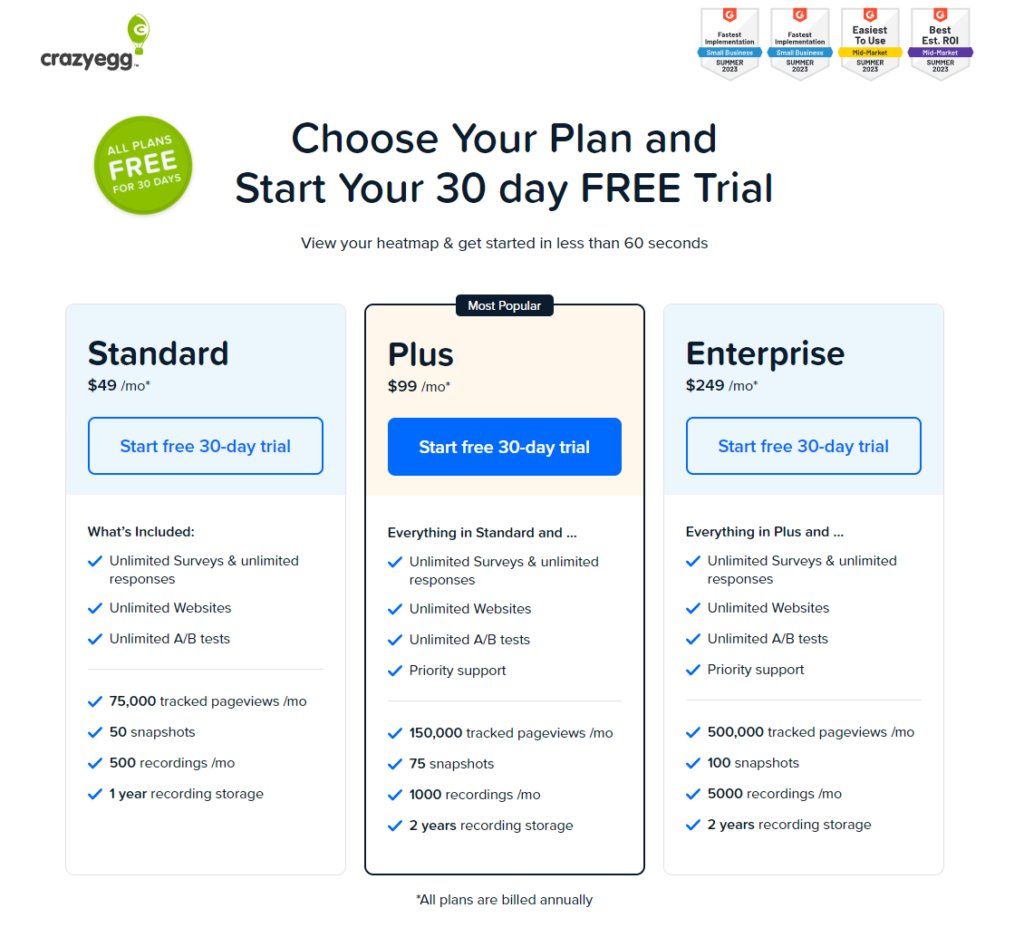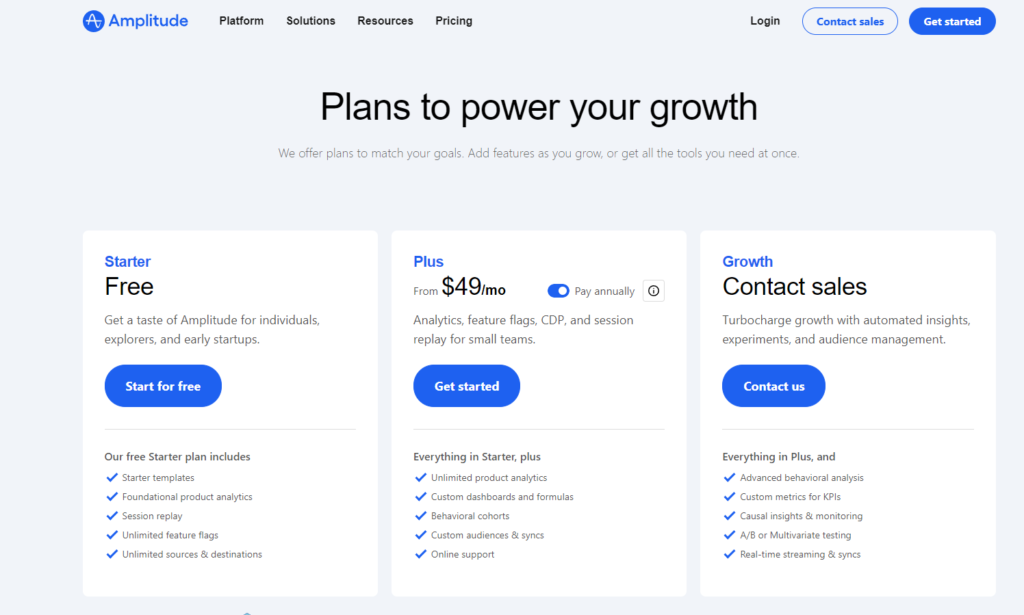When it comes to unraveling the mysteries of your website’s performance, the analytics tool you choose is your Sherlock Holmes. In the bustling world of digital analytics, Crazy Egg and Amplitude emerge as two of the keenest detectives. Both tools promise to shed light on the elusive “why” behind user behaviors, but their approaches and specialties differ as much as Holmes and Watson.
Crazy Egg | Amplitude |
|---|---|
| G2 Score – 4.2 out of 5 stars | G2 Score – 4.5 out of 5 stars |
| TrustRadius Score – 7.6/10 | TrustRadius Score – 8.3/10 |
User Interface and Ease of Use
In the realm of digital analytics, the path to insights should be as obstacle-free as possible. A tool that requires a PhD to decipher is less a helpful assistant and more a source of frustration. Here’s how Crazy Egg and Amplitude measure up when it comes to welcoming users into the world of data without overwhelming them.
Crazy Egg:
Stepping into Crazy Egg’s interface is like walking into a well-organized, brightly lit room. Everything you need is within easy reach, and there’s no clutter to distract you from your mission—understanding your visitors’ behavior. Crazy Egg’s dashboard focuses on visual analytics, such as heatmaps, scroll maps, and session recordings. These tools are not just powerful; they’re designed to be intuitive. Even if you’re diving into analytics for the first time, Crazy Egg guides you through with a gentle hand, making complex data seem less daunting. The platform excels in making the invisible actions of your website visitors visible and understandable, all without requiring you to sift through mountains of raw data.
Amplitude:
Amplitude, on the other hand, is like stepping into a state-of-the-art lab filled with every analytical instrument you could imagine. It’s designed for those who crave depth and detail in their data exploration. Amplitude offers event-based analytics that go beyond surface-level actions, allowing you to dig deep into user journeys and segmentations. While this provides a treasure trove of insights for those who know how to navigate its complexities, newcomers to the world of analytics might find themselves facing a steep learning curve. That said, Amplitude is continuously improving its user experience, aiming to make its powerful tools more accessible to a broader audience.
Data Integration and Sources
In the digital age, your website doesn’t exist in isolation—it’s a crucial piece of a much larger puzzle that includes everything from social media interactions to CRM data. The ability of your analytics tool to integrate with various data sources and provide a holistic view of your customer’s journey is paramount. Let’s decode how Crazy Egg and Amplitude fare when it comes to weaving together different strands of data into a coherent narrative.
Crazy Egg:
Crazy Egg focuses its lens primarily on visualizing user behavior on your website. Its specialty is in generating heatmaps, scroll maps, and session recordings directly from your site’s data. When it comes to pulling in external data, Crazy Egg’s approach is more about simplicity and straightforwardness. It integrates well with website optimization and A/B testing tools but doesn’t natively ingest data from wider marketing or product platforms.
For businesses primarily interested in enhancing their website’s user experience and conversion rates through direct, actionable insights, this level of integration is often sufficient. However, if your needs include a comprehensive analysis that combines website behavior with broader customer interaction data from other platforms, Crazy Egg’s capabilities might seem a bit focused.
Amplitude:
Amplitude is built for the data-hungry explorer, designed to ingest a wide variety of data sources beyond your website. It excels in event-based analytics, allowing you to track specific actions across your web and mobile apps and integrate these with data from other systems like CRMs, email marketing platforms, and even custom databases. This broad integration capability enables you to construct a detailed, 360-degree view of your customer’s journey—from the first website visit through product usage to post-purchase behavior. For teams looking to understand and optimize every step of the customer lifecycle, Amplitude’s extensive data integration features provide the depth and breadth needed to make informed, data-driven decisions.

Related: Check out our free SEO suite

Reporting and Data Visualization
The true power of an analytics tool isn’t just in the data it collects but in how it presents that data, transforming raw numbers into insights that can inform decisions and strategies. A tool’s reporting and data visualization capabilities are critical in making data accessible and actionable. Let’s see how Crazy Egg and Amplitude stack up in translating data analytics into visual narratives that drive action.
Crazy Egg:
With its roots deeply embedded in visual analytics, Crazy Egg thrives in presenting data through engaging, easy-to-understand visual reports. Heatmaps, scroll maps, and session recordings don’t just tell you what’s happening on your site; they show you. These visualization tools are designed for immediate impact, highlighting areas of your website that grab attention and those that don’t, without requiring you to dig through complex data tables or reports. Crazy Egg’s reports are inherently actionable, providing clear guidance on where to make changes to improve the user experience and conversion rates. However, businesses looking for more traditional, numeric-based reporting or the ability to customize reports extensively might find Crazy Egg’s offerings a bit limited. Crazy Egg excels in its niche, offering straightforward visual insights ideal for quick decision-making and iterative website improvements.
Amplitude:
Amplitude approaches reporting and data visualization with the precision of a scientist, offering a wide array of customizable reports and dashboards that can accommodate nearly any analytical need. From cohort analysis and conversion funnels to user journey mapping, Amplitude provides deep insights into how users interact with your product across different platforms. Its strength lies in its flexibility and depth, allowing businesses to drill down into the specifics of user behavior and segment data in myriad ways. This level of detail is invaluable for teams looking to understand the nuances of user engagement and retention, optimize product features, or tailor marketing strategies based on comprehensive user data. While Amplitude’s reporting capabilities are powerful, they require a more significant investment of time and resources to fully leverage, which could be a barrier for smaller teams or businesses without dedicated data analysts.
Customer Support and Community Engagement
The realm of analytics can sometimes feel like navigating a dense forest — having a guide can make all the difference. This is where customer support and community engagement play a pivotal role. Not only do they help you solve issues more efficiently, but they also offer a platform for exchanging ideas, learning best practices, and staying updated on new features. Let’s evaluate how Crazy Egg and Amplitude support their users beyond the software interface.
Crazy Egg:
Crazy Egg offers a range of support resources tailored to help users maximize the tool’s potential. The platform provides an extensive online help center, filled with articles, guides, and tutorials designed to answer common questions and walk you through features step by step. For direct assistance, Crazy Egg offers email support, ensuring personalized help is available when you need it. While the platform may not offer real-time chat or phone support, the quality and responsiveness of its email support are generally well-regarded.
The Crazy Egg community, though not as extensive as some larger platforms, is engaged and helpful. Users share insights, tips, and strategies across various online forums and social media, fostering a sense of camaraderie. This community can be particularly valuable for new users looking for practical advice on optimizing their website analytics efforts.
Amplitude:
Amplitude’s approach to customer support and community engagement reflects its position as a comprehensive analytics platform. It offers a detailed knowledge base that covers everything from getting started guides to advanced analytics techniques. For more personalized support, Amplitude provides email, chat, and, for enterprise customers, dedicated account management. This tiered approach ensures that users can find the right level of support for their needs.
The Amplitude community is vibrant and active, with users ranging from data analysts to product managers and marketers. Amplitude hosts regular webinars, user groups, and forums where users can connect, share experiences, and learn from one another. Additionally, the Amplitude blog is a valuable resource, offering insights into analytics trends, best practices, and product updates. This level of engagement not only helps users solve technical issues but also encourages a deeper understanding of analytics and how it can drive business growth.
Pricing and Scalability
As businesses grow, their data analytics needs evolve, making the scalability of an analytics tool an essential factor to consider. Additionally, the pricing structure of a tool can significantly impact its accessibility and long-term viability for a company’s budget. Let’s break down how Crazy Egg and Amplitude address these crucial aspects, helping you understand which tool might best align with your financial and scaling considerations.
Crazy Egg:

Known for its user-friendly interface and visual analytics, Crazy Egg offers a straightforward pricing model that caters to businesses of varying sizes. With several tiered plans, Crazy Egg makes it easy for small businesses and startups to begin optimizing their websites without a significant initial investment. Each plan includes access to core features like heatmaps, scroll maps, and session recordings, with the primary differences being in data history, the number of pageviews tracked, and the number of active pages.
One of the strengths of Crazy Egg’s pricing model is its simplicity, making it clear what you’re paying for and allowing you to scale up as your website’s traffic increases. This scalability ensures that as your business grows, Crazy Egg can continue to serve your website analytics needs without requiring a sudden shift to a more expensive or complex platform.
Amplitude:

Amplitude offers a more nuanced pricing model that reflects its broader analytics capabilities. The platform provides a free tier designed to support the needs of smaller teams and startups, giving them access to powerful event-based analytics without upfront costs. This can be particularly appealing for businesses in the early stages of growth, allowing them to leverage detailed user behavior insights and funnel analysis to inform product and marketing strategies.
As businesses grow and their data analytics needs become more sophisticated, Amplitude’s pricing scales to offer more advanced features, including more detailed segmentation, behavioral cohort analysis, and cross-platform tracking. This scalability makes Amplitude an excellent option for companies expecting to expand their analytics efforts significantly, requiring a platform that can keep pace with their growth.
Conclusion
In the dynamic world of digital analytics, choosing between Crazy Egg and Amplitude comes down to understanding your specific needs, goals, and resources.
Crazy Egg shines with its intuitive interface, visual analytics such as heatmaps and session recordings, and a straightforward pricing model. It’s designed for businesses looking to quickly and effectively optimize their website’s user experience. With its focus on accessibility and actionable insights, Crazy Egg is ideal for small to medium-sized businesses that need a direct, visual understanding of how users interact with their site.
Amplitude, on the other hand, offers a robust analytics platform capable of deep dives into user behavior, journey mapping, and event-based analytics across multiple platforms. Its scalability and comprehensive data integration make it suitable for businesses poised for growth or those requiring detailed analysis of user interactions to inform product development and marketing strategies. Amplitude’s tiered pricing accommodates a range of business sizes, from startups to large enterprises.
Read Next:
- GetResponse vs eSputnik: The Best Email Marketing Tool for 2024
- AWeber vs MoonMail: The Best Email Marketing Tool for 2024
- AWeber vs Aritic Mail: The Best Email Marketing Tool
- GetResponse vs Delivra: The Best Email Marketing Tool for 2024
- Constant Contact vs EmailOctopus: Best Email Marketing Tool






















Comments are closed.